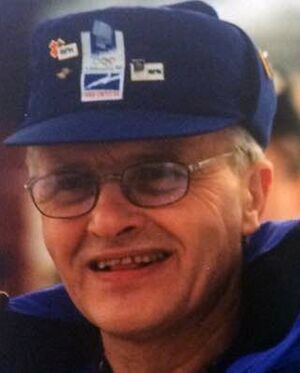Einar Førde
( politician, media executive, deep state functionary) | ||||||||||||||
|---|---|---|---|---|---|---|---|---|---|---|---|---|---|---|
 | ||||||||||||||
| Nationality | Norwegian | |||||||||||||
| Alma mater | • University of Oslo • The Norwegian Armed Forces Intelligence School | |||||||||||||
| Spouse | • Brit Fougner • Synnøve Nymo | |||||||||||||
| Party | Norwegian Labour Party | |||||||||||||
Director-General of the Norwegian Broadcasting Corporation.
| ||||||||||||||
Einar Førde was a Norwegian politician of the Labour Party and Director-General of the Norwegian Broadcasting Corporation.
Contents
Background
Førde was born in the industrial site Høyanger during the Second World War, as the son of Gudleik Førde (1904–1998) and Dagny Hagen (1910–1991). After graduating from Eidsvoll High School, he was admitted and completed the Armed Forces' Russian course (now part of The Norwegian Armed Forces Intelligence School).
He further studied political science, economics and history at the University of Oslo. In 1966 he was chairman of the Norwegian Student Society and chairman of the Norwegian Hellas Committee 1970-1975, protesting against the Greek junta.
Førde was also a middle distance runner. He was Norwegian champion in the 4 x 400 meter relay in 1961 and silver in the 1500 m in 1963.
Political Career
He joined the central committee of the Labor Party as a deputy member in 1965 and was promoted to deputy chairman in 1981. Here he sat as number two in the party until he resigned in politics in 1989.
He was Minister of Education and Church Affairs from 1979 to 1981.
From 1986 to 1989 he was parliamentary leader in the Labor Party.
Idealist to pragmatist
Førde joined the Labor Party as a radical student and opponent of NATO. A few years later, he fought for the EEC-opponents in the party during the EEC struggle in 1970-1972, which led to Norway not joining the later European Union. From here he built up his position further as champion the left wing of the party.[1]
It was Førde who led the work on the new party program, which was adopted at the national convention in 1981. Especially in retrospect, this is seen as the first formal step towards "modernization" - a right turn - in the Labor Party. Together with party leader Gro Harlem Brundtland and party secretary Thorbjørn Jagland, he drove this development further into the 1980s. The background from the left was useful for Førde to get the Labor Party to open up for active use of market forces. Critics saw this as unprincipled kneeling to big business, and thus in harmony with party tradition.[1]
Førde had to give up the dream of becoming a leader and prime minister. His close friendship with Arne Treholt, arrested for espionage in 1984 and sentenced to 20 years in prison the following year, may have been the most important reason why Førde did not reach the top.
Norwegian Broadcasting Corporation
When Førde became Director-General of the Norwegian Broadcasting Corporation (NRK) in 1989, the former monopoly service was anything but ready for the competition with the new private radio and TV stations.
Einar Førde invested in expansion, and managed to secure the service's position by expanding with a much larger focus on sports and entertainment.
Førde's last important position was as chairman of the board of the Norwegian Telegram Agency from 2001 until he died of cancer in 2004, at the age of 61.